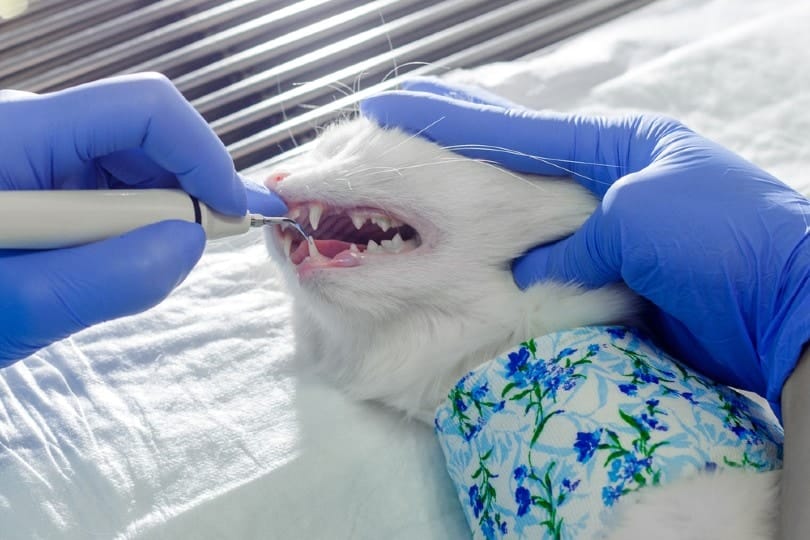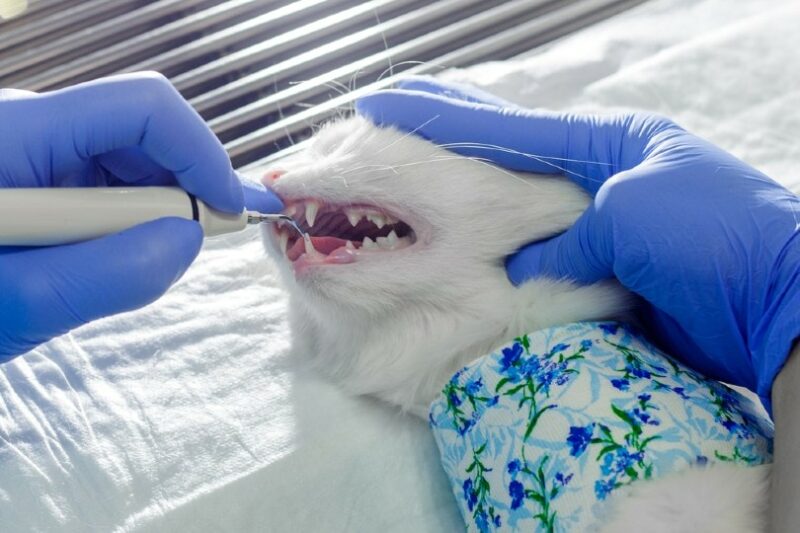We all rely on dental professionals to keep our teeth in tip-top shape. The same concept extends to your kitties—dental work is essential. Taking your cats in for routine cleanings will reduce the likelihood of dental disease later in life. It also helps remove all the hard-to-reach buildup you can’t get with at-home brushing.
We’re sure you’re wondering how much these cleanings will cost. The good news is, the price varies, and you can find veterinary offices to work with you on payment options.

The Importance of Feline Dental Health
Teeth brushing might be an easy thing to overlook in vet care, but it’s a vital part of cat health. These little fluff balls rely on us to clean their teeth to prevent plaque or tartar buildup from kittenhood.
If you notice plaque buildup, it’s even more vital to get your cat in for a professional cleaning. Plaque buildup leads to tartar, which is yellow and stiff—not easy to remove at all. Once the tartar sits on the gumline awhile, that’s when you might run into trouble.
Dental disease can affect up to 85% of all domestic house cats, usually at 3 years of age and older. These numbers are tremendous. Cat teeth brushing is often neglected unintentionally. But letting your cat go without care is a surefire sign they will experience periodontal disease as they age.
Periodontal disease doesn’t just cause trouble like tooth loss and jawline decay. It can also lead to heart and lung issues. So, it’s important not to skip over this area of care for your cat’s health and livelihood.
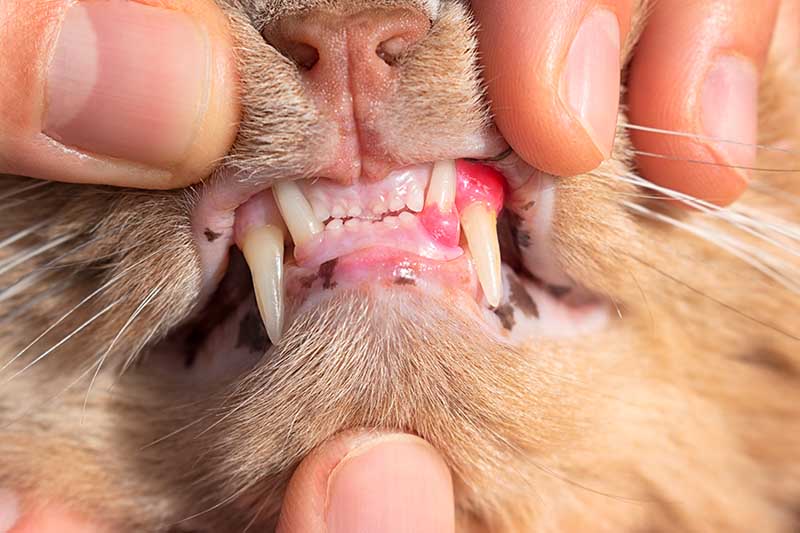
How Much Does Professional Cat Teeth Cleaning Cost?
On average, you can expect to pay between $100 and $400 for a dental cleaning, depending on a few factors.
- Age — Age says a lot about your cat’s teeth. As cats get older, plaque and tartar buildup are a lot more common. If they have excessive buildup, your vet will spend longer on the cleaning, which can spike costs.
- Size — A kitten’s teeth might take less time than a full-grown adult, which can influence the total price.
- Temperament — Some cats don’t settle down as easily as others. If your vet needs to offer a heavy sedative to work on their mouths, it can increase the full amount.
- Location — Costs usually fluctuate depending on where you are on the map. Larger, high-end cities will obviously charge more than a rural vet.
- Clinic — Each clinic will have its own rates, depending on the vet.
- Out-of-Pocket — Specific pet insurances cover primary care, which is based on the plan you choose. Any other expenses will be out of pocket.
While these factors can influence the price, most veterinarians charge a flat-rate fee for routine dental cleanings. Additional costs can come into play if there are unexpected factors during your visit. Your trusted veterinarian determines total costs.
Rural vs City Veterinarian Offices
You might notice that each vet’s costs vary drastically depending on where you live.
For instance, this veterinary facility in the bustling city of Boise, Idaho, has feline teeth cleaning rates of $620—which is definitely on the high end. Whereas, in the much smaller town of Newark, Ohio, this veterinary office charges only $160. So, you can see the difference.
Now, even in larger cities, $620 for feline teeth cleaning is somewhat atypical. As we mentioned earlier, the safe average is between $100 to $400, which can increase depending on the vet.
Larger cities can have more competitive rates, which can really put a financial strain on owners. Rural vets are generally lower cost, but some might have to make quite a drive to get to a less expensive country location. So, there are positives and negatives to each scenario.
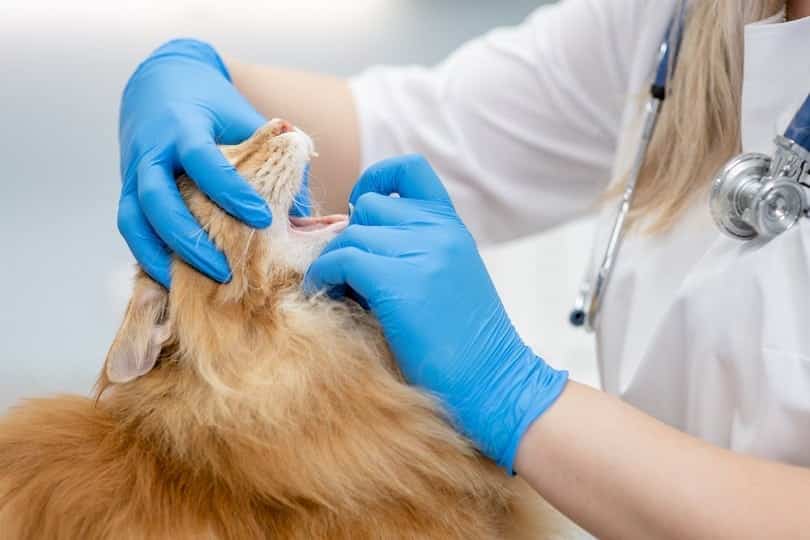
Additional Costs to Anticipate
If your cat goes in for a routine cleaning and they find there’s more damage, you might have to pay for additional testing.
- X-rays ($125–$250) — If your vet is noticing any unusual cracks, cavities, or breaks in your cat’s teeth, they might need an X-ray for a closer look.
- Anesthesia & Sedatives ($25–$200) — If your cat needed any extensive work done, they might require a sedative or treatment to keep them calm or put them to sleep.
- Treatment ($25–$100) — If your cat has an infection, like a bacterial infection or abscess, your vet might prescribe antibiotics.
- Additional Services ($25+) — While your cat is getting its teeth cleaned, your vet might notice something out of the ordinary. If they discover any other underlying health issues or problems that concern them, it could climb tremendously, depending on testing.
So, now you can see how prices can climb depending on the services provided. Your vet will go over any additional costs before proceeding with further action. You should always have the right to choose before you pay any extra money.

How Often Should I Get My Cat’s Teeth Professionally Cleaned?
It would be best if you got your cat a professional cleaning once per year. Your vet can use special tools to help them remove any buildup on the teeth and gum line.
At home, you should keep up with routine care, brushing roughly three times per week. Brushing your cat’s teeth isn’t a substitute for annual cleanings.
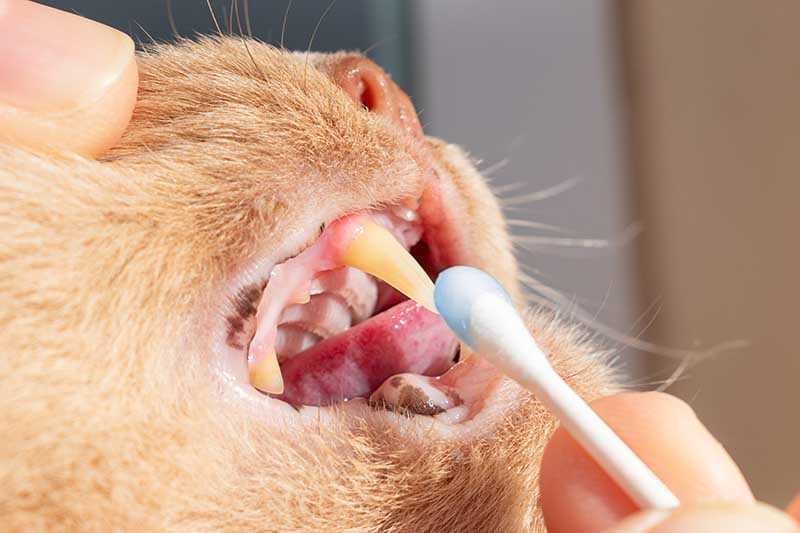
Does Pet Insurance Cover Dental Fees?
With an increase in vet care awareness, many insurance companies are tailoring policies for our beloved pets. Vet costs can be so high and take us by surprise sometimes. It brings a vital peace of mind, knowing your pet is covered.
So, what exactly does pet insurance include? It depends on the provider. Like human insurance policies, you can tailor the plan to fit your needs. Many cover emergencies but also have the option for preventive care and grooming coverage.
To know whether dental care is covered, explore available plans to see if it fits your needs. In many standard policies, services like dental cleanings are not included. But companies like Embrace Pet Insurance do create policies to cover dental accidents.
Having this coverage is a terrific idea since one trip to the vet may eventually warrant some type of dental surgery.

What to Do For Your Cat’s Teeth in Between Cleanings
You have quite a few options to keep your cat’s mouth hygiene up to par at home.
- Finger brushing — if you have a cat that will allow you, you can always try to brush your cat’s teeth at home. Using a finger brush, you can gently massage the teeth, gums, and (if you’re lucky) the tongue.
- Offer dental chews — many companies make dental chews and treats to maintain or improve your cat’s dental health.
- Offer a dry kibble diet — dry kibble keeps the teeth nice and clean since it breaks down plaque with its crunch.
- Utilize gels and water additives — you can add safe dental gel or solution to their water for extra cleaning power.
- Tip: If you notice buildup on your cat’s gum line, try to avoid wet food until after a professional cleaning.

Conclusion
Your cat might not be a huge fan of dental cleanings, but they only benefit from it. Regular cleanings also eliminate the likelihood of dental surgery later in your cat’s life. Routine care is easier on your wallet than a massive bill after years of mouth neglect.
So, even though it might feel like an expense you can put off, it’s worth it in the long run. Work with your vet or pet insurance company to help answer any financial questions or concerns.
Related Read:
- 7 Best Cat Foods for Older Cats with Bad Teeth 2021 – Reviews and Top Picks
- My Cat Lost a Tooth – Should I Be Worried?
Featured Image Credit: Burdun Iliya, Shutterstock

